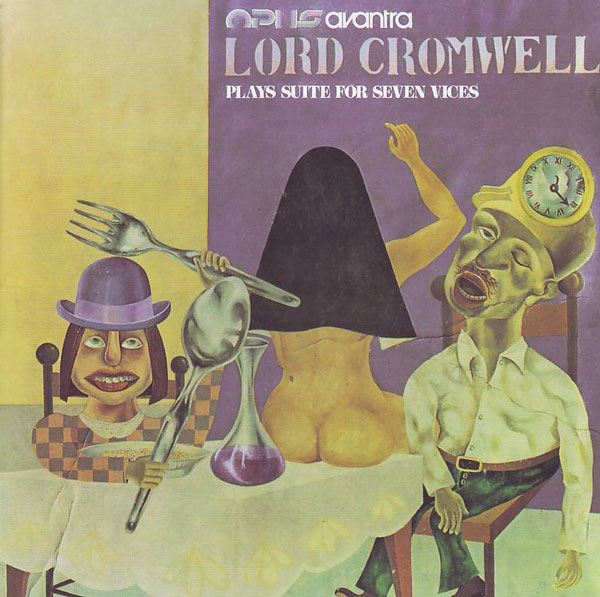|
|
|
01 |
Flowers on Pride |
|
|
|
05:30 |
|
|
02 |
Avarice |
|
|
|
05:26 |
|
|
03 |
Lust |
|
|
|
03:53 |
|
|
04 |
My Vice |
|
|
|
02:00 |
|
|
05 |
Ira |
|
|
|
07:52 |
|
|
06 |
Gluttony |
|
|
|
03:05 |
|
|
07 |
Envy |
|
|
|
05:44 |
|
|
08 |
Sloth |
|
|
|
04:32 |
|
|
09 |
Allemanda |
|
|
|
03:03 |
|
|
|
| Country |
Italy |
| Packaging |
Jewel Case |
| Spars |
DDD |
| Sound |
Stereo |
|
|
|
Informations\n\nItalian reissue CD\nlabel : Artis\nnumber : ARC 003\nyear : 1989\nnote : \n\noriginal release\nlabel : Suono\nnumber : SRLP 1002\nyear : 1975\n
Line-up / Musicians
- Alfredo Tisotto / Steinway and Fender piano, Hammond, synthesizer and Pipe organ
- Luciano Travella / flute
- Renato Zanella / Fender guitar
- Enrico Professione / violin
- Pieregidio Spiller / violin
- Riccardo Perraro / cello
- Paulo Siani / percussion, drums
- Gina Bianco, Susan Worshap, Cindy Brasher, Carl Adams / vocals
- American Chorus Setaf
Opus Avantra - Lord Cromwell Plays Suite for Seven Vices (1975)
[CD - Artis - ARCD 003]
I can't think of another album that really sounds like this. For one thing, the combination of timbres is unusual: old-school synthesizers, sawing violins, piano, very clear electric guitar, flute, percussion (both rock and classical) and a highly theatrical but largely vibrato-free American-accented soprano. On top of that, its influences are atypical; where avant-prog usually draws on composers from the first half of the 20th century and sometimes from the Renaissance, Opus Avantra seem to be more concerned with the Baroque and Classical periods and the avant-garde of the 50s and 60s. Sometimes these styles are cleanly separated from each other, as in the lyrical Bach-goes-symph "Gluttony," or "My Vice," in which 60s-style analog synths slide and whir behind an atonal harpsichord part. In the longer pieces, styles are thrown together almost willy-nilly: "Avarice," for instance, starts out sounding like Boulez circa Structures Ia, but passes through some tempestuous pseudo-Beethoven and then melds the two together with blurry atonal synth parts and droney pedal points in the piano.
A caveat: Opus Avantra sometimes come dangerously close to the border between stylistic experimentation and cheese. The opening of "Flowers on Pride," for instance, includes timpani, sloppily-played Bach misquotations and melodramatic incantations of "pride is a fever!" Still, they manage to redeem themselves with some good old-fashioned early 18th century pomp (before pomp was really pompous), which then gives way to something halfway between Mozart's Requiem and gospel music, or maybe Jesus Christ Superstar. However questionable the band's taste, they are clearly skilled composers, and that manages to make even the sketchiest tracks seem worthwhile -- as evidenced further by "Allemanda," which more than makes up for its "triumphant" mood with some beautiful vocal counterpoint and a firm avoidance of harmonic cliche'. Besides, some of the pieces are just cool, like the stormy, piano-led (and rather PFS-like) avant-jazz-rock of "Envy," replete with tritones and featuring sections as headbang-inducing as anything 5uu's ever did. Another standout is the fragmented, rhapsodic, strikingly dense "Ira," which includes such things as: a) more jazzy avant-prog grooving b) machine gun sound effects c) pure instrumental chaos (think Motor Totemist Guild and you're halfway there) d) a beautiful, dissonant section for pipe organ, violins and male and female voices, singing with the clear tones of Early Music specialists.
Overall, I find that Lord Cromwell has too many questionable moments for me to call it a great album. Nevertheless, my cringes are almost always uncertain ones, and at least some of the album is clearly excellent. I can't recommend it as a great release overall, but it's certainly an interesting one, and absolutely worth getting if you're looking for something different. - Alex Temple [January 2003]
